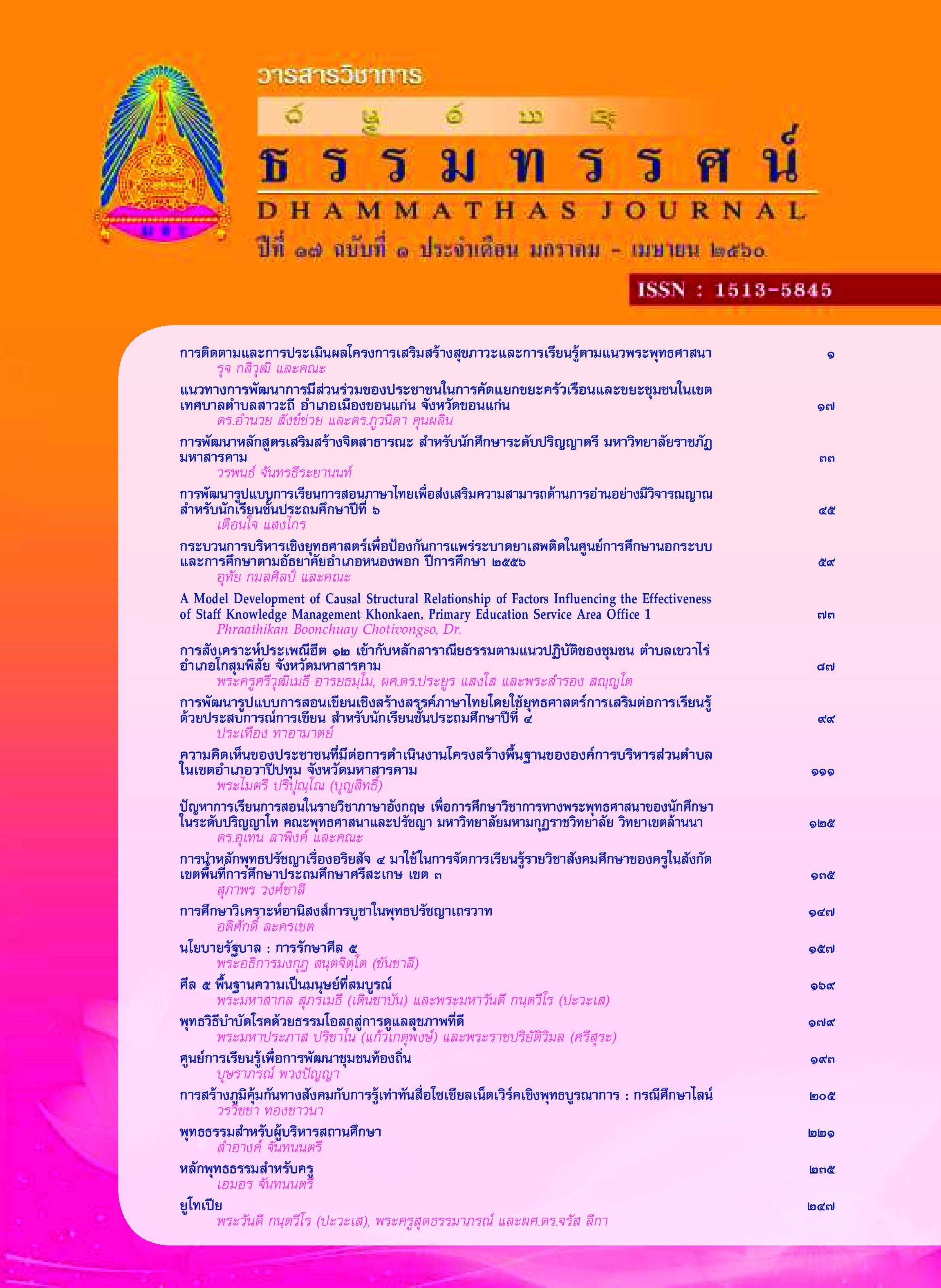การศึกษาวิเคราะห์อานิสงส์การบูชาในพุทธปรัชญาเถรวาท
Main Article Content
Abstract
บทคัดย่อ
การวิจัยนี้มีวัตถุประสงค์ ๑) เพื่อศึกษาแนวความคิดเรื่องการบูชาในพุทธปรัชญาเถรวาท ๒) เพื่อศึกษาอานิสงส์การบูชาในพุทธปรัชญาเถรวาท ๓) เพื่อวิเคราะห์อานิสงส์การบูชาในพุทธปรัชญาเถรวาท สารนิพนธ์นี้เป็นการวิจัยเชิงเอกสาร โดยศึกษารวบรวมข้อมูลจากพระไตรปิฎก อรรถกถา ฎีกา และผลงานของท่านผู้รู้ในทางศาสนาที่เกี่ยวข้องในการบูชา นำมาวิเคราะห์และจัดระบบหมวดหมู่
ผลการวิจัยพบว่า
๑. การบูชา ได้แก่ การทำสักการะ เคารพนอบน้อม การกราบไหว้ การยกย่อง การสรรเสริญ การยอมรับการนับถือ ด้วยความเลื่อมใส ศรัทธา ด้วยความจริงใจ แสดงออกได้หลายทาง เช่น การเชิดชูยกย่อง สรรเสริญ สวดขอพร การขอร้อง การอ้อนวอน การเซ่นบวงสรวง การสังเวย การยอมรับนับถือ การให้ความสำคัญและการปฏิบัติตามคำสั่งสอน เป็นต้น
การบูชามีมาก่อนพุทธกาลหลายพันปีมาแล้ว แต่เป็นการบูชาต่อสิ่งศักดิ์สิทธิ์ที่ไม่เห็นตัวตนของศาสนาอื่น เช่นการบูชาเทพเจ้าต่างๆของศาสนาฮินดู ซึ่งส่วนใหญ่จะเป็นการบูชาเพื่ออ้อนวอนขอสิ่งที่ตนปรารถนาอยากจะได้ บูชาเพื่อให้สิ่งศักดิ์สิทธิ์ช่วยประทานพรหรืออำนวยให้ตนมีความสุขความเจริญอันเป็นการกระทำที่สืบทอดต่อเนื่องกันมาเป็นเวลาที่ยาวนานตามความเชื่อของแต่ละลัทธิศาสนา
ส่วนพระพุทธศาสนาฝ่ายเถรวาทสอนว่า การบูชาเป็นมงคลสูงสุดประการหนึ่ง ดังมีบทสวดมนต์บทหนึ่งว่า ปูชา จ ปูชนียานํ เอตมฺมฺคลมุตฺตมํ แปลว่า การบูชาบุคคลที่ควรบูชาเป็นมงคลสูงสุด ซึ่งเป็นหลักธรรมสำคัญ นั่นคือควรบูชาบุคคลหรือสิ่งที่ควรบูชาเท่านั้น ไม่ได้มีคำสอนให้บูชาสิ่งอื่นที่นอกเหนือจากนี้แต่อย่างใด
บุคคลที่ควรบูชาได้แก่ บุคคลผู้มีคุณงามความดี มีคุณธรรมเช่นพระพุทธเจ้า พระธรรมพระสงฆ์แลบิดามารดาเป็นต้น ส่วนสิ่งที่ควรบูชา ก็อย่างเช่นสิ่งที่เกี่ยวเนื่องกับพระพุทธเจ้า มีเจดีย์บรรจุพระบรมสารีริกธาตุ เป็นต้น และได้แสดงการบูชาไว้ ๒ ประการ คืออามิสบูชา ได้แก่การบูชาด้วยสิ่งของอุปโภคบริโภคและปฏิบัติบูชา คือการบูชาด้วยการปฏิบัติตามคำสั่งสอนของพระพุทธเจ้านั่นเอง พระพุทธองค์ทรงสรรเสริญปฏิบัติบูชาว่าเป็นการบูชาที่เลิศที่สุด ผู้หวังผลในการปฏิบัติตามหลักธรรม จึงควรน้อมนำเอาคำสอนของพระพุทธองค์ไปปฏิบัติให้เกิดมรรคผล ด้วยการละกรรมชั่วกระทำแต่กรรมดี และมุ่งพัฒนาจิตไปสู่ความหลุดพ้นด้วยหลักธรรมไตรสิกขาคือศีล สมาธิ และปัญญา
๒. อานิสงส์ หมายถึง ผลดีที่จะเกิดขึ้น (อานิสงส์คือผลดี ถ้าผลที่ชั่วจะใช้คำว่า วิบาก) ยกตัวอย่างเช่นเกษตรกรปลูกมะม่วงผลที่จะได้ก็คือการได้กินลูกมะม่วง หรือได้ร่มมะม่วงตอบแทนเป็นต้น อานิสงส์ของการบูชา การแสดงความเคารพนับถือ นอบน้อมต่อบุคคล หรือสิ่งที่ควรบูชาด้วยความนับถือเสื่อมใสเห็นคุณค่า และความสำคัญของบุคคลหรือสิ่งนั้น หรือด้วยการแสดงออกทางกายทางวาจาและทางใจ ด้วยความเคารพนับถืออย่างจริงใจ เช่น การสวดสรรเสริญ สวดขอพร การขอร้องอ้อนวอน หรือพิทักษ์รักษาเทิดทูนไว้ย่อมเป็นสิริมงคล เกิดความปลอดภัยมีความเจริญรุ่งเรืองในชีวิตและมีความโชคดีเป็นต้น
๓. อานิสงส์การบูชา ในพุทธปรัชญาเถรวาทแสดงผลที่จะได้จากการบูชาบุคคลที่ควรบูชามีพระพุทธเจ้า พระธรรม พระสงฆ์แลบิดามารดาเป็นต้น บุคคลเหล่านี้เป็นพระอรหันต์เป็นบัณฑิตนักปราชญ์ มีกายวาจาใจสะอาดบริสุทธิ์ย่อมแนะนำแต่ในทางดีทางเจริญ ผู้บูชาจึงย่อมได้ประโยชน์สูงสุดคือ การบรรลุมรรคผล นิพพาน หรือตามควรแก่ผลที่เกิดจากการปฏิบัติ หากยังไม่ถึงขั้นบรรลุธรรม เมื่อสิ้นชีวิตก็จะไปสู่สุคติโลกสวรรค์ หรือถ้าเกิดในโลกมนุษย์อีกก็จะได้ไปเกิดในตระกูลสูง ได้รับแต่ความสุขความเจริญ ตรงข้ามกับการคบหรือบูชาคนชั่วคนพาล ผู้บูชาย่อมได้รับแต่ความทุกข์ร้อนเหมือนเช่นที่พระเจ้าอชาตศัตรูบูชาหรือคบหากับพระเทวทัตจนต้องทำปิตุฆาตอันเป็นกรรมที่หนักห้ามสวรรค์ห้ามนิพพานในชาตินี้ไปเลยทีเดียว
Abstract
The objectives of this work paper were 1) to study the principles of worship as described in the Theravāda of Buddhism philosophy, 2) to study the in the Theravāda of Buddhism philosophy, and 3) to analyze the values of benefits of worshipping in the Theravāda of Buddhism philosophy. The thesis was included in the qualitative category, with data collected from the Holy Buddhist scripture of Tipitaka, commentaries, sub-commentaries, and related documents. The collected data were analyzed, classified, summarised and reported in the descriptive style.
The results of the study were as follows:
1. Worshipping maintained many shades of meanings such as paying respect, homage and salutation with faithfulness and sincerity, which could be expressed by means of honoring, admiration, appreciation, praying and offering materials and bringing into practice the teachings and guidance taught and advised by respectable and worship-worthy people.
According to Theravāda Buddhism, worshipping is regarded as one of the best
practices or auspicious activities, but it should be performed on the ground that the
person or object that was the center of respect should be a good and virtuous person.
The worship is divided into two main kinds, namely, worshipping by offering materials
and by bringing into practice the instruction or guidance. Of these two kinds, the
worshipping by means of practicing is taught by the Buddha as the highesr kind of
worships, which implied the following the Buddhist teachings, i.e., not doing all evils,
doing good and purifying one’s mind, which In other words, they are the Three Principles
of Training or Tisikkhã comprising Sila (Precept), Samãdhi (Meditation) and Paññã (Wisdom).
2. Worshipping menas homage, respect and humility towards the person. It can be expressed by means of appreciation, bodily and verbal expression, respect, praise, and asking for safety and fortune to happen to one’s life. The worshipping is aslo crucial to the mental development. It leads to compassion in physical actions, speech and mind. According to Theravāda Buddhism, worshipping is a blessing to oneself and others. However, according to the Buddha, the supreme worshipping is the one by doing or practicing according to the doctrine.
3. The benefits of worshipping are as follow. Generally speaking, humans become more respectable to one another in society. At the ultimate level, one can attain the enlightenment. At the end of one’s life, the person is reborn in heaven. If he or she is reborn in the human world, the person is born in a good family. The components of the worshipping include appropriate objects, and appropriate gestures in appropriate occasions.

